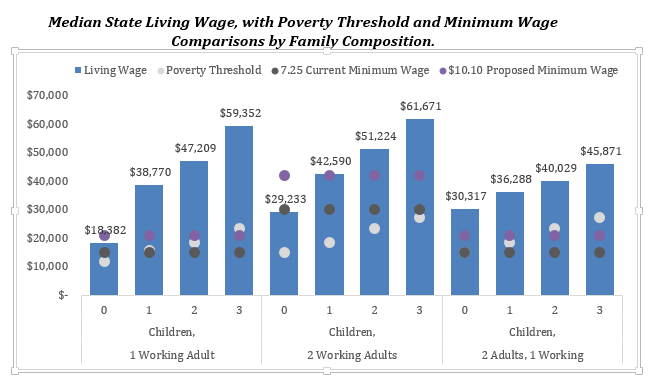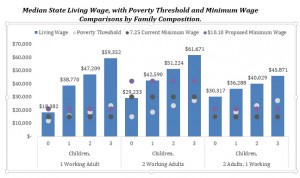MIT Living Wage Calculator: Why Higher Wages Help Everybody
-
-
slice.mit.edu
- 65
Filed Under
Recommended


Update July 2014: Professor Glasmeier reports that Ikea is now using the calculator to set their US wages.
Certainly this tool, with county-by-county statistics, provides data relevant to current discussions on raising the federal minimum wage. And its creator, Professor Amy Glasmeier, offers insights on how to transform America’s unemployment and underemployment problems into a solution that can help individuals and families as well as national productivity.
Glasmeier, professor of economic geography and regional planning, first developed the calculator in 2004 during a study of why some geographical areas that emerge from poverty, return to it in a few years. The difference between communities that returned to poverty—or not—was the rate of people participating in the labor market, she says. And a key reason people leave the labor market is because they can’t earn enough money in the traditional workforce to survive.
The MIT Living Wage Calculator lets you figure out how much is “enough” to live in your county by comparing the living wage—based on the barebones cost of housing, food, transportation, and child and health care—against the poverty wage and the minimum wage.

This is not a middle class lifestyle—the living wage does not include any savings and only one set of clothing for either hot and cold weather, not both. Surviving on the living wage is tough, she says, and it’s nearly impossible to live on the current federal minimum wage, $7.25. In comparison, the living wage for a family including one adult and one child in the state of Massachusetts is $24.84; for Mississippi, it’s $16.88. Check the living wage in your area.
So what has spurred public interest in raising the federal minimum wage to $10.10 now?
“We are seeing this cascading of human stories that are quite tragic, and everybody, even in the most sophisticated occupations like finance and health care, know someone who has lost their job or has had to move down in the labor market and is working for less than their skills are worth,” Glasmeier says. In addition, many parents see that their young college-educated children are under or unemployed, and employers see that their minimum wage employees often work a second job to cover basic living expenses.
Glasmeier says the argument that a higher minimum wage would reduce employment is questionable. Research shows that many employers prefer not to cut employees, whom they have invested time and money in, when wages go up. Rather, they may invest in productivity, so their returns go up. So raising wages plus public sector employment can be good investments, she says.
“When we began with the minimum wage, the argument was made that you were under utilizing human resources if you did not employ people and pay them a wage they could live on,” she says. “If, as a nation, we have millions of people out of work or under employed, then we are not using our assets wisely. If people are unable to achieve their maximum potential, that is also a drag on the economy.”
To paraphrase Henry Ford, you have to pay people enough to buy the things they produce—but raising wages also boosted Ford’s bottom line by reducing employee attrition. So, at least in that example, raising wages really did help everybody.








Comments
Charles T
Sun, 02/23/2014 8:08pm
What about the teenager who doesn't NEED a "living wage" b/c he lives with his parents. The minimum wage leaves no room for this sort of position. Hence the growth of unpaid internships.
It seems if the gov't must guarantee a minimum income, it should cover the difference between the VALUE of the work and the desired minimum income. These levels are difficult to define and hence ripe for corruption, but the alternative is levying an expense on employers whose workers don't produce enough to justify the imposed minimum wage. Which is what will give us fully automated fast food restaurants...
Katherine
Fri, 02/21/2014 9:01pm
Unemployment rates:
Massachusetts: 7.0%
Mississippi: 8.0%
(Bureau of Labor Statistics, December 2013)
The Mississippi poverty rate is about double the Massachusetts rate across all age groups, too. (Census Bureau data) So you can live on less money in Mississippi, but your chances of getting a job that pays that much are lower, too. Which is why Massachusetts residents *aren't* moving to Mississippi in droves.
Tom Hafer
Fri, 02/21/2014 6:04pm
The above comments sufficiently expose the speciousness of this article. The question then becomes: why is MIT publishing this piece of political spin? This diminishes the credibility of the entire Institution.
Walter Sickel
Fri, 02/21/2014 5:26pm
The data for the state of Illinois shows a minimum wage of $8.00 per hour. The minimum wage has been at $8.25 for several years.
Gerry Madea
Fri, 02/21/2014 1:50pm
Discussion of raising minimum wage rates in the context of living wage calculations totally ignores the impact on young folks (teenagers, students, and young adults living at home). Young folks want to, and often need to, get in touch with working. Some of us worked at various jobs to earn money for college - setting bowling pins, cutting lawns, raking leaves, pulling weeds, shoveling snow, caddying at the golf course, and other jobs including summer unskilled work at companies, making deliveries, and hotel bellboy and desk clerk work. At 69 years of age, I have light, unskilled work at my home and could use help at lower wages - work that does not call for higher wages. Most of my very successful friends started out in their teenage years doing all kinds of low wage work. They learned quite a bit about working! Furthermore, I am opposed to governments stepping into economic relationships by dictating minimum wages. I also object to M.I.T. apparently supporting raising minimum wages by allowing professors to publicize their political economics under the M.I.T apparent sponsorship.
Doug
Fri, 02/21/2014 12:20pm
Why stop at $10.10/hr? If it's so great that everyone make more money, why not set the minimum wage $50/hr, or even $100/hr? Might as well throw in a beach house for everyone while we're at it. Let the free market work and we'll all be just fine, thank you.
Jay Tilley
Fri, 02/21/2014 11:44am
My comment is not awaiting anything it's being censored just as it would have been in the Soviet Union. MIT makes me sick!!!!
Darryl
Fri, 02/21/2014 11:43am
"What kind of first-level thought do we have coming out of my alma mater today??"
Better yet, she's TEACHING this to her students.
I've let those 10 PM phone calls from Cambridge MA go unanswered for months now, I see no signs of that letting up.
Jay Tilley
Fri, 02/21/2014 11:18am
This liberal nonsense is not worthy of association with MIT''s name. If central planning worked (the government mandated minimum wage) the Soviet Union would have been a worker's paradise, not a country that couldn't feed itself. When wages are artificially raised two things happen. The business owners profit margin is reduced, the business becomes less competitive with regard to return on investment and capital flows elsewhere (like overseas). These unwanted investments (business employing minimum wage workers) close and unemployment rises. Alternatively, wage increases are passed on to consumers, who buy less of the product, and again unnecessary workers are let go and unemployment rises. Economics 101.
MarkPClassOf84
Fri, 02/21/2014 10:06am
"Research shows that employers do not tend to cut employees, whom they have invested time and money in, when wages go up. Rather, they invest in productivity" - in other words, they don't add employees ... even as the population continues to grow. Big help there.
Gerardw
Fri, 02/21/2014 7:51am
It is true research shows unemployment does not increase with higher minimum wage. It's also true that research shows unemployment does increase with higher minimum wage. See http://www.washingtonpost.com/blogs/wonkblog/wp/2013/02/13/four-things-to-know-about-obamas-minimum-wage-increase/ for some links.
Jerry Miller
Thu, 02/20/2014 9:35pm
Change that $3000 to $6000 based on an average of 2000 hours of work per year.
Jerry Miller
Thu, 02/20/2014 9:34pm
There wasn't enough space in this short article for Professor Glasmeier to present the study supporting her assertion that employers won't fire employees when they are forced to pay $10/hour versus $7/hour (or equivalently when they are forced to buy health insurance or pay higher payroll taxes for those employees) but will instead attempt to increase (labor) productivity. What that means is that as the business grows the n+1st employee has to generate, in this case, another $3000 of output. That n+1st employee might not be added until the business has grown enough to make that extra $3000 for each existing minimum wage employee. In turn, that means there may be a very long time while employment levels are flat. So, the tradeoff could be that those who are employed make a living wage, but many others won't get the opportunity to earn anything. That's one group that a higher wage is not good for. It is also not good for the company owners, who, at least in the short run, make lower profits.
Kevin Crystal
Thu, 02/20/2014 9:19pm
And what about all the people put out of work or jobs not created because the economics of an industry doesn't allow companies to raise wages and maintain the same employment level?
EHBristol
Thu, 02/20/2014 9:15pm
Blanket denial of employment reduction not helpful to credibility. When employers invest to improve productivity (at assumed constant total production, or reduced if consumption is down) they reduce the need for workers.